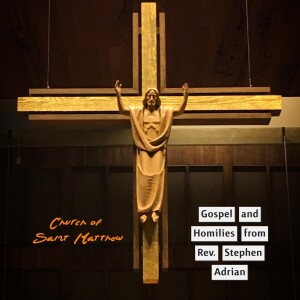
Monday Nov 04, 2024
01.23.2021 Homily
In the gospel reading we find Jesus in Saint Mark's gospel, beginning his public ministry by going into the region of Galilee and announcing the coming of the kingdom of God. It's the same announcement that John the Baptist made earlier in the story. The kingdom of God is at hand, repent, receive the good news of God's love. That's the fundamental teaching that Jesus gives consistently. The kingdom of God is among you, change the way you think, change the way you view the world, change the way you live life and follow me.
In the first reading that that Becky did for us from the prophet, Jonah, we hear about God sending Jonah into the city of Nineveh to call those people to a newness of life, to call those people from a way of presently living, presently thinking, presently acting to a new way of being that brings them into union with or into right relationship with God and with each other. He calls them to reconciliation. That's at the very heart of the gospel message. We reconciled, the kingdom of God is at hand, repent and believe.
Well, a week from tomorrow, a week from Sunday, the last Sunday of the month, we begin here, the practice of celebrating the sacrament of reconciliation on the last Sunday of every month at two o'clock in the afternoon and celebrating it according to the general absolution, the general confession norm. Now that we are in the midst of the pandemic, the word from Pope Francis is that we need to provide opportunities for reconciliation that do not bring people into immediate contact with each other, but that would allow for social distancing. The form of the sacrament with general absolution allows for that. Beginning next Sunday afternoon at two o'clock is when we carry out the first one of those. Then every last Sunday of the month at two o'clock, again, we'll celebrate the sacrament of reconciliation.
Now, why is it important that this form of the sacrament be celebrated? It's important because there are many, many, many people who find it very difficult, if not impossible, to approach the sacrament one-on-one for a whole variety of reasons. There are many, many, tens of thousands, hundreds of thousands, millions of Catholics who have been harmed in the sacrament. They've been belittled. They've been put down, they've been shamed. They've been hurt in the sacrament. They make the decision that they're not going to go back there, they're not going to subject themselves to the possibility of that happening to them again. What they do is year after year, after year, they stay away from the sacrament. They carry within themselves, very often, a burden of guilt and a burden of shame that they aren't able to get rid of. There are those who just can't bring themselves to say to another human being, what it is that they've done, that they're too ashamed to do that. They're too afraid to do that and so they stay away from the sacrament of reconciliation.
There are all kinds of reasons why people will find a difficult to approach the sacrament one-on-one, face-to-face, individually. This sacrament celebrated in the communal form, provides an opportunity for us to come together, to acknowledge our sinfulness, to confess our sins to the Lord, God, in our own hearts, where we don't have to say it to anyone else. As we stand together as sinful people seeking God's mercy, then we pray that the mercy of God truly be given to us. The prayer of absolution is prayed, by which our sins are forgiven. It becomes an avenue for all of us in one way or another, but especially for some people for whom the other forms of the sacrament are impossible.
I invite you to participate in the celebration of the sacrament on next Sunday at two o'clock, but more than that, I invite you to invite those who may be members of your family or friends who have not approached the sacrament for a long time, for very, very good reason, for very good reason. This provides them an opportunity to come to the sacrament, to celebrate the mercy and the forgiveness, the graciousness of God in a way that is respectful to them, and in a way that allows them to be safe. Allows them to not have to put themselves in a situation that they would prefer not to do.
The mercy of God is present for all of us. It's a mercy that God seeks to pour out upon us. It's a mercy that each and every one of us calls for each, every one of us seeks. All of us are very well aware of our own weaknesses, our own failure, our own sin. We're also well aware of God's desire to reunite with us, to draw us closer and more deeply in union with him. The sacrament of reconciliation is an opportunity for that to occur.
No comments yet. Be the first to say something!